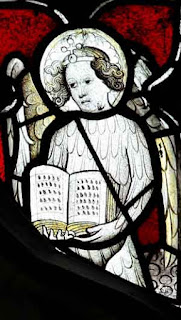Michaelmas is over for another year ... right?

The feast of St Michael and All Angels is over for another year, yes. Day by day, however, Mattins and Evensong echo this feast throughout the year, daily drawing us into a renewed participation in the "wonderful order" that is our communion with the angelic hosts. Mattins and Evensong do so in praise, through a focus on the Christological centre, and in the petitions of the second and third collects. The daily sanctus of the Te Deum joins our morning praise with that of the angels and archangels: To thee all Angels cry aloud : the heavens, and all the powers therein. To thee Cherubin and Seraphin : continually do cry, Holy, Holy, Holy : Lord God of Sabaoth; Heaven and earth are full of the Majesty : of thy glory. The use of the Benedicite does not lose this emphasis, for it begins with 'O ye Angels of the Lord, bless ye the Lord'. The fact that each month's recitation of the Psalter also ends at evening of the 30th day (repeated in those months with 31 days) wit...














